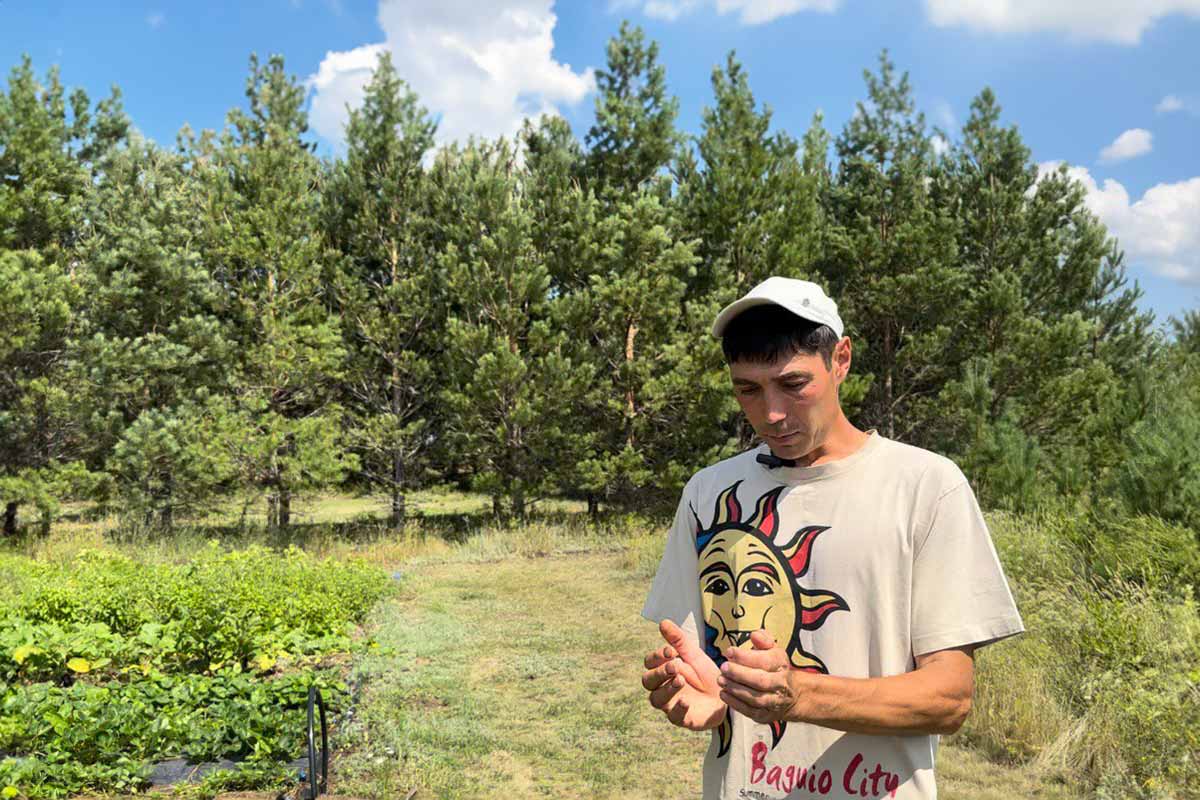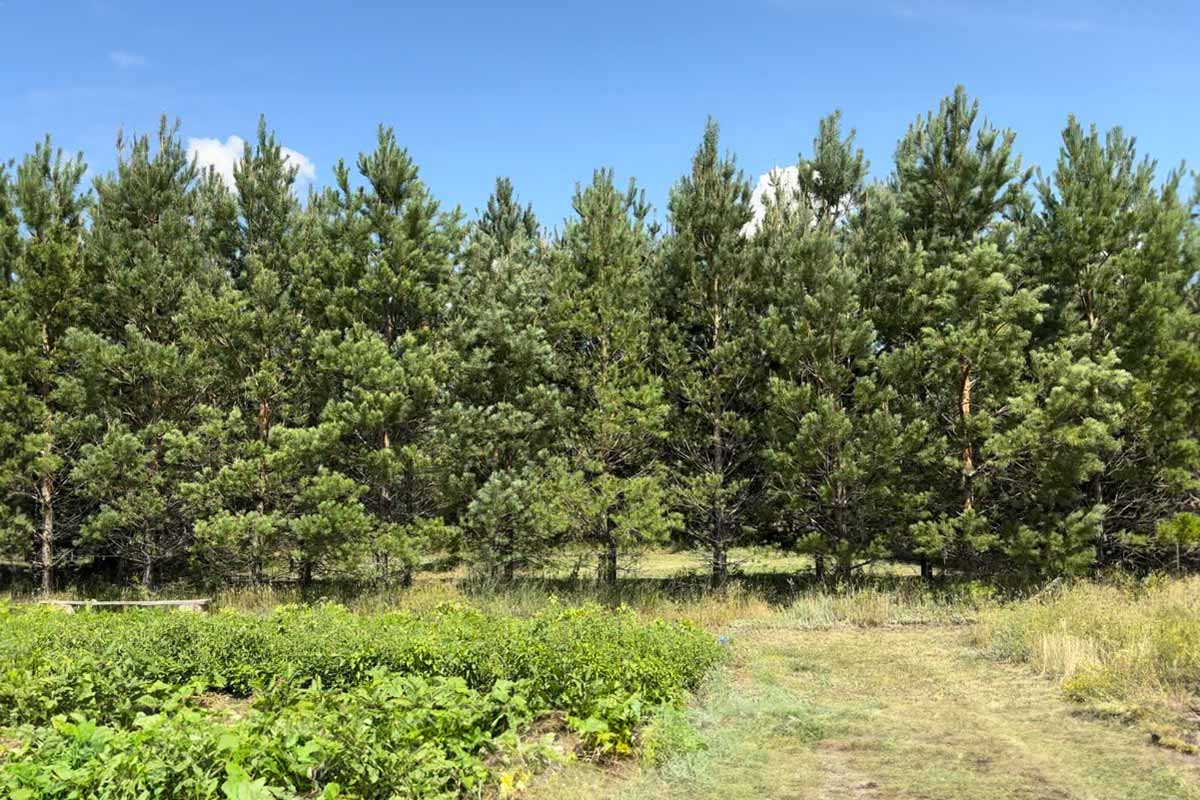Kazakstan’s Eco-settlers: Turning Barren Land Into Forest
A group seeking an alternative way of life started planting trees; two decades on, they have created an oasis.
Timur Makarov well remembers the vast, barren steppe that greeted him and his mother when they moved to this corner of north-western Kazakstan in 2002. Twenty years on, everywhere he turns there are thousands of trees: pines, cedars, lindens and oaks dominate the landscape in what is now the settlement of Vedrukh.
“Most trees are on the country’s red list [of endangered species],” the 47-year-old told IWPR, pointing at the hedgerow around his house. “Every tree transmits its energy to people and the area around them. My mom planted that oak, this is her plot and her home. She passed away in 2005, and this oak is a living memory of her.”
Makarov was one of the nearly 100 other “eco-settlers” who arrived in the 150 hectare area where the settlement now stands.
Driven by the desire to live in close connection with nature, the group started planting trees and building small houses using recycled and eco-friendly materials such as clay. The Kazak authorities leased them the area for 49 years and the settlers divided it into one-hectare sections. The plots, 96 in total, cannot be sold, but must passed on to family members.
The village has its rules: smoking, alcohol and swearing are banned. Hunting is also forbidden.
“We are the garden city. We plant 80 per cent forest and 20 per cent fruit and berry crops, vegetable and fruit [,” explained 63-year-old Sabilia Nygmetova, adding that artificial fertilisers are prohibited.
“Of the 96 plots, 70 have owners, about half of them are active. The inactive are those who either have moved to another town, or those whose family does not support our idea…they may possibly return later [in life],”explained Makarov, who acts as head of the village. He added that about ten families live there on a regular basis, while others work in town and come at weekends or during the holidays.
All decisions are taken collectively and while Makarov has no formal power, his role is to represent the settlement’s interests when interacting with the authorities.

IN HARMONY WITH NATURE
Vedrukh is a combination of two words: “ved”, meaning “knowing” in Russian and “rukh”, the Kazak term for “spirit”. The original settlers were influenced by The Ringing Cedars of Russia, a series of books Russian writer Vladimir Megre published in the late 1990s, which inspired movements across the post-Soviet world seeking an alternative way of life.
For years, the community has defended its privacy, which in turn has triggered suspicion. Residents of nearby villages have labelled the settlers cult followers, while authorities have routinely surveilled them.
In time, the community has opened up to visitors while welcoming new settlers.
Newcomers are required to embrace the settlement’s philosophy and are admitted by collective decision. Once admitted, they pay a lump sum of 180,000 tenge (about 450 US dollars) that goes into a general fund covering the costs of the centralised irrigation system, which the settlers built themselves, and electricity.
An annual payment of 10,000 tenge (22 dollars) contributes to land tax and specific development needs.
Newcomers have to build their own houses, but can count on the residents’ help. In the early days, noted Nygmetova, the group lived in tents and dugouts.
“Relatives visited me and saw the small trees and my dugout, they wondered why we moved here… Now they come, see the large trees and smell the fresh scent [of plants]... we don’t need any Borovoye,” the former school principal said, referring to a popular lake holiday resort in northern Kazakstan.
Large hedgerows with lofty, slender trees surround the houses.
There is power in nature, noted Nygmetova. According to her, people living in harmony with nature will always live in prosperity.
“Why did Stalin begin the “dekulakisation” after a trip across Siberian villages in the 1930s?” she asked, referring to the Soviet campaign of repressions, deportations and executions of millions of “kulaks,” or prosperous peasants.
“Because he saw that rich people, land owners, lived there, they were masters of their lives. They did not depend on authorities and knew how to live in harmony with nature. He saw they had fresh, natural products on their tables and he was scared of this part of society.”
Aleksandr Kablov joined Vedrukh in 2017. A shift worker at Kazakstan’s oil and gas fields of Tengiz and Karachganak, the 40-year-old lives in the settlement when he is on holiday.
“About six years ago I worked with a man who read the books [which] inspired the original settlers. I got interested in them and read all of them at once. I then started to think where to build [my] ancestral home,” he told IWPR.
As his parents live in Uralsk, close to Verdrukh, he heard of the settlement but was sceptical because his friend told him it resembled a sect. In 2017, Kablov came to visit.
“I was walking through the settlement and I saw a trailer home with a dog running right at me. I recalled seeing that very trailer and the dog before, when I was looking for a plot to create the ancestral home, but it was in a different place,” he said. “The dog approached me and began to bark at a specific plot. I think it was a sign…I chose plot number 40, the one the dog barked at.”

PASSING ON TO THE NEXT GENERATION
Makarov met Saida while living in Vedrukh. Their two children, who go to school in the nearby village of Makarovo, will one day inherit the family’s plot.
This is a key principal for the settlers, who refer to their plots as “ancestral homes”.
“Our children will have an opportunity to take care of trees planted by us,” Makarov said, adding that they are in contact with like-minded people both in Kazakstan and beyond. “Every person must leave something of value behind. Now everyone tries to leave material goods behind: an apartment, a car, money. But those are perishable things, and we leave behind a living memory here.”
Amangeldy Kanzaliev, an original settler who now has three grandchildren, agrees.
“I tell my older grandson that when time comes, I will have to give this home to somebody and if he wants to, I can give it to him because someone has to continue a good and significant deed,” the 66-year-old told IWPR. “I do not force him up, but I have made my offer to him.”
“When we came here, we had nothing but bites on our arms and feet and the spirit of romanticism. We were dreamers and were scared of nothing: we had a purpose,” he said. “Now every morning I sit in front of the window and look at the forest that [has grown] a few metres away from me.”
This publication was prepared under the "Amplify, Verify, Engage (AVE) Project" implemented with the financial support of the Ministry of Foreign Affairs, Norway.
